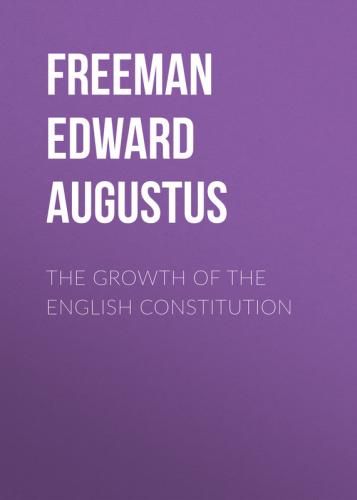But, besides that growth of the King’s power which followed naturally on the growth of the King’s dominions, another cause was busily at work which clothed him with a personal influence which was of almost greater moment than his political authority. To a large portion of his subjects, to all the men of special wealth or power, the King gradually became, not only King but lord; his subjects gradually became, not only his subjects but his men. These names may need some explanation, and I will again go back to Tacitus as our starting-point. Side by side with the political community, the King, the nobles, the popular Assembly, all of them strictly political powers, he describes another institution, a relation in itself not political but purely personal, but which gradually became of the highest political moment. This was the institution of the comitatus, the system of personal relation between a man and his lord, a relation of faithful service on one side, of faithful protection on the other. Let us again hear the words of the great Roman interpreter of our own earliest days51.
“It is no shame among the Germans to be seen among the companions (comites) of a chief. And there are degrees of rank in the companionship (comitatus), according to the favour of him whom they follow; and great is the rivalry among the companions which shall stand highest in the favour of his chief, and also among the chiefs which shall have the most and the most valiant companions… When they come to battle, it is shameful for the chief to be surpassed in valour; it is shameful for his companions not to equal the valour of their chief. It is even a badge of disgrace for the remainder of life if a man comes away alive from the field on which his chief has fallen. To guard, to defend him, to assign their own valiant deeds to his credit, is their first religious duty. The chiefs fight for victory; the companions fight for their chief.”
This is the description given by a Roman historian of the second century; let me set beside it the words of an English poet of the tenth. He is describing the battle of Maldon in 991, which was fought by the East-Saxons under their Ealdorman Brihtnoth against the invading Northmen. The Ealdorman has been killed; two of his followers have fled, one of them on the Ealdorman’s horse, and every word that is put into the mouth of his faithful companions turns upon the personal tie between them and their lord52.
“Thereon hewed him
The heathen soldiers;
And both the warriors
That near him by-stood,
Ælfnoth and Wulfmær both,
Lay there on the ground
By their lord;
Their lives they sold.
There bowed they from the fight
That there to be would not;
There were Odda’s bairns
Erst in flight;
Godric from battle went,
And the good man forsook
That to him ofttimesHorses had given.
He leapt on the horse
That his lord had owned,
On the housings
That it not right was.”
Presently we read of the deeds done by his Thegns over his body;
“There was fallen
The folk’s Elder,
Æthelred’s Earl;
All there saw
Of his hearth’s comrades
That their lord lay dead.
Then there went forth
The proud Thanes,
The undaunted men
Hastened gladly;
They would there all
One of two things,
Either life forsake,
Or the loved one wreak.”
Then one of the Thegns speaks;
“Neither on that folk
Shall the Thanes twit me
That I from this host
Away would go
To seek my home,
Now mine Elder lieth
Hewn down in battle;
To me is that harm most;
He was both my kinsman
And my lord.”
Then another speaks in answer;
“How thou, Ælfwine, hast
All our Thanes
In need-time cheered.
Now our lord lieth,
The Earl on the earth,
That of us each one
Others should embolden,
Warmen to the war,
That while we weapons may
Have and hold,
The hard falchion,
Spear
